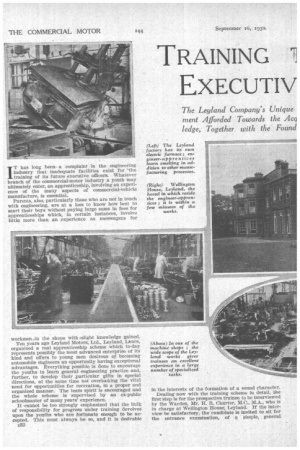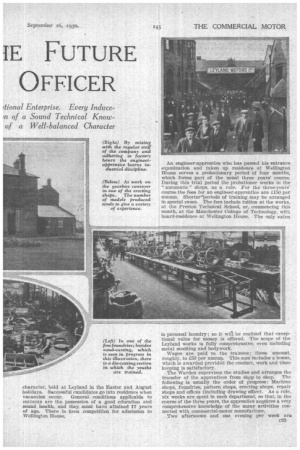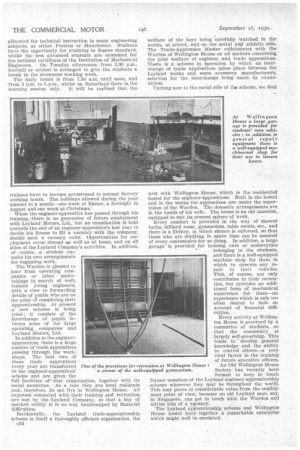TRAINING 1E FUTURE EXECUTIV OFFICER
Page 54

Page 55

Page 56

If you've noticed an error in this article please click here to report it so we can fix it.
The Leyland Company's Unique ment Afforded Towards the Acq ledge, Together with the Found rtional Enterprise. Every Inducern of a Sound Technical Knowof a Well-balanced Character
IT has long been.. a complaint in the engineering industry that inadequate facilities exist for ' the training of its future executive officers. Whatever branch of the commercial-motor industry a youth may ultimately enter, an apprenticeship, involving an experience of the many aspects of commercial-vehicle manufacture, is essential.
Parents, also, particularly those who are not in touch with engineering, are at a loss to know how best to start their boys without paying large sums in fees for apprenticeships which, in certain instances, involve little more than an experience as messengers for workmen An the shops with slight knowledge gained.
Ten years ago Leyland Motors, Ltd., Leyland, Lanes, organized a real apprenticeship scheme which to-day represents possibly the most advanced enterprise of its kind and offers to young men desirous of becoming automobile dngineers an opportunity having exceptional advantages. Everything possible is done to encourage the youths to learn general engineering practice and, further, to develop their particular gifts in special directions, at the same time not overlooking the vital need for opportunities for recreation, in a proper and organized manner. The team snirit is encouraged and the whole scheme is supervised by an ex-public schoolmaster of many years' experience.
It .cannot be too strongly emphasized that the bulk of responsibility for progress under training devolves upon the youths who are fortunate enough to be accepted. This must always be so, and it is desirable d32 in the interests of the formation of a sound character.
Dealing now with the training scheme in detail, the first step is for the prospective trainee to be interviewed by the Warden, Mr. H. H. Charter, M.O., MA., who is in charge at Wellington House; Leyland. If the interview he satisfactory, the (''andidate is invited to sit for the entrance examination, of a simple, general character, held at Leyland in the Easter and August holidays. Successful candidates go into residence when vacancies occur. General conditions applicable to entrants are the possession Of a good education and sound health, and they, must have attained 17 years of age_ There is keen competition for admission to Wellington House, . An engineer-apprentice who has passed his entrance examination and taken up residence at Wellington
• house serves a probationary period of four months, . which forms part of the usual three years' course. During this trial period the probationer works in the " automatic" shops, as a rule. For the three-years' course the fees for an engineer-apprentice are £150 per annum. Shorteeperiods of training may be arranged in special cases. The fees include tuition at the works, at the Preston Technical School, or, commencing this month, at the Manchester College of Technology, with board-residence at Wellington House. The only extra
is personal laundry ; so it will be reali2eci that omeeptonal value for money is offered. The scope of the Leyland works is fully comprehensive, even including metal smelting and bodywork.
Wages are paid to the trainees ; these amount, roughly, to £50 per annum. This sum includes a bonus, which is awarded provided the conduct, work and timekeeping is satisfactory.
The Warden supervises the studies and arranges the transfer of the apprentices from shop to shop: The following is usually the order of progress:Machine shops, foundries, pattern shops, erecting -shops, repair shops and offices (including drawing office). As a rule, six weeks are spent in each department, so that, in the course of the three years, the apprentice acquires a very comprehensive knowledge of the many activities connected with commercial-motor manufacture.
Two afternoons and one evening per week are c33 allocated for technical instruction in many engineering subjects, at either Preston or ,Manchester. Students have the opportunity for studying to degree standard, whilst the less advanced students are examined for the national certificate of the Institution of Mechanical Engineers. On Tuesday afternoons, from 2.30 p.m., football or cricket is arranged to give the students a break in tile strenuous working week.
The daily round is from 7.30 a.m, until neon, and from .1 p.m. to 5 p.m., whilst on Saturdays there is.the morning session only. It will be realized that the trainees have to become accustomed to normal factory working hours. The holidays allowed during the year amount to a month—one week at Easter, a fortnight in Angust and one week at Christmas.
When the engineer-apprentice has passed through his training, .there is no guarantee of future employment with Leyland Motors, Ltd., but an examination is held towards the end of an engineer-apprentice's last year to decide his fitness to fill a vacancy with the company, should such a vacancy exist. Opportunities for employment occur abroad as well as at home, and on all sides of the Leyland Company's activities. In addition, of course, a student Scan make his own arrangements for beginning work.
The Warden is pleased to hear from operating companies or other undertakings in search of well; trained young engineers, with a view to forwarding details of pupils who are on the point of completing their apprenticeship. At present .a new scheme is being tried ; it consists of the interchange of pupils between some of the large operating companies and Leyland Motors, Ltd.
In addition to the engineerapprentices, there is a large number of trade apprentices passing through the work shops. The best two of these trade apprentices
every year are transferred One of the provisions for recreation at Wellington House ; to the engineer-apprentices' a corner of the well-equipped gymnasium.
scheme and are given the
full facilities of' that organization, together with its social amenities. As a rule they are local residents and, therefore, do not live in Wellington House. All expenses connected with their training and recreation are met by the -Leyland Company, so that a boy of marked ability is in no way handicapped by financial difficulties.
Incidentally, the Leyland trade-apprenticeship scheme is itself a thoroughly efficient organization, the C34 welfare of the boys being carefully watched in the works, at school, and on the social an athletic side. The Trade-Apprentice Master collaborates with the Warden of Wellington House on all matters concerning , the joint welfare of engineer and trade apprentices. There is a scheme in bperation by which an interchange of trade apprentices takes place bkween the Leyland works and some accessory manufacturers, selection for the interchange being made by examination.
Turning now to the social side of the scheme, we deal
nrst with Wellington House, which is the residential hostel for the engineer-apprentices. Both in the hostel and in the works the apprentices are under the supervision of the Warden. The domestic arrangements are in the handS of his wife. The house is an old mansion,
equipped to suit its present sphere of work.
Every comfort is provided in the way of shower baths, billiard room, gymnasium, table tennis, etc., and there is a library, in which silence is enforced, so that those who are studying in spare time can be assured of every convenience for so doing. In addition, a large garage is provided for housing cars or motorcycles belonging to the students, and there is a well-equipped machine shop for them in which to execute any repair to their vehicles. This, of course, not only contributes to their recreation, but provides an additional form of mechanical experience for them—an experience which is only too often denied to lads on account of financial difficulties.
Every activity at Wellington House is governed by a committee of students, so that the community is largely self-governing. This tends to develop general knowledge and the ability to control others—a very vital factor in the training of future executive officers.
An Old Wellington House Society has recently been formed to keep in touch former members of the Leyland engineer-apprenticeship . scheme wherever, they may be throughout the world. This may prove of considerable value from the enaraoyment Point of view, because an old Leyland man, say, in Singapore, can get in touch with the Warden and advise him of a vacancy.
The Leyland apprenticeship scheme and Wellington House hostel form together a remarkable enterpriae which might well be emulated.












































































































